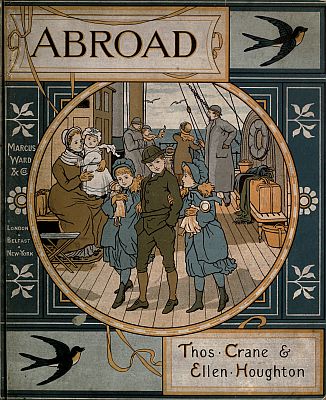
The Project Gutenberg EBook of Abroad, by Various
This eBook is for the use of anyone anywhere at no cost and with
almost no restrictions whatsoever. You may copy it, give it away or
re-use it under the terms of the Project Gutenberg License included
with this eBook or online at www.gutenberg.org
Title: Abroad
Author: Various
Illustrator: Thomas Crane
Ellen E. Houghton
Release Date: November 12, 2007 [EBook #23460]
Language: English
Character set encoding: ISO-8859-1
*** START OF THIS PROJECT GUTENBERG EBOOK ABROAD ***
Produced by Mark C. Orton, Emmy and the Online Distributed
Proofreading Team at http://www.pgdp.net (This file was
produced from images generously made available by The
Internet Archive/American Libraries.)

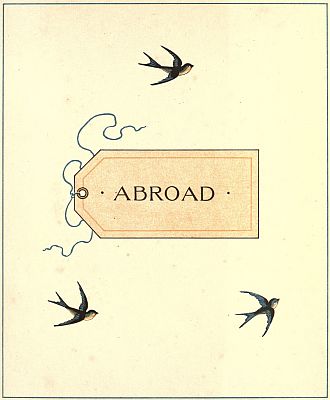
| 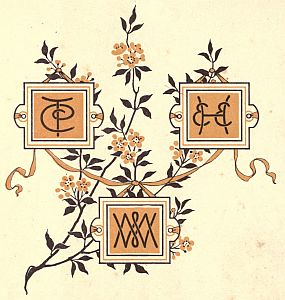
|
BON VOYAGELast year, Dear Friends, we met "At Home,"And now "Abroad" we mean to roam: With all who choose to spare the time We'll wander to a neighbouring clime. Nor need you leave your own fireside, For with fair Fancy for our guide, Our winged thoughts, in swallow-flight, Shall cross the Channel smooth and bright: And in despite of wind or weather, We'll make our little tour together. Now on our Pictures you shall look:— To you we dedicate our Book. |
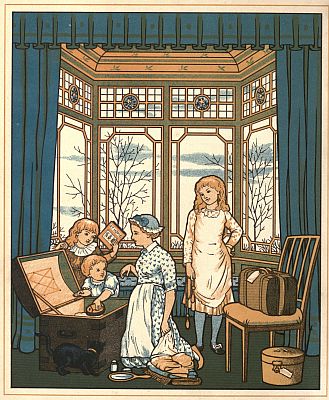
| 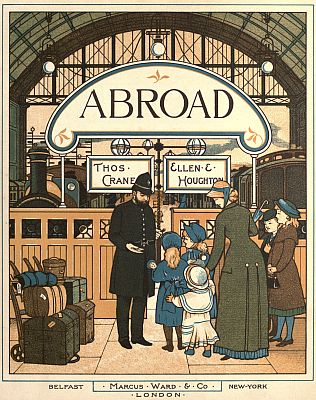
|
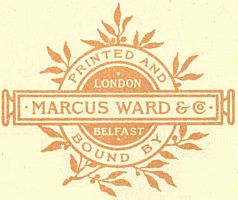
CONTENTS
|
|||||||||||||||||||||||||||||||||||||||||||||||||||||||||||||||||||||
THE VERSES ARE BY VARIOUS WRITERS
|
|||||||||||||||||||||||||||||||||||||||||||||||||||||||||||||||||||||||||||
The "Folkestone Express" sped on like a dream, And there lay the steamer fast getting up steam. |
| Then at the Folkestone harbour, down they go | Nellie, Miss Earle, and Bertie too appear, |
| Across the gangway to the boat below; | Whilst Dennis, with the rugs, brings up the rear. |
| Mabel and Rose just crossing you can see, | May looks behind her with an anxious air, |
| Each holding her new doll most carefully. | Lest Father, at the last, should not be there. |
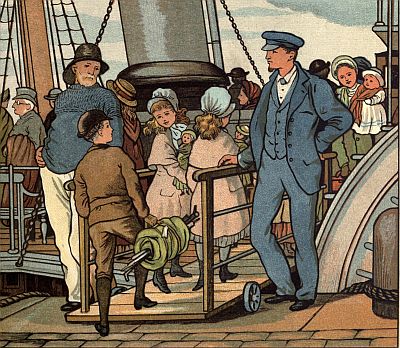
| Our children once on board, all safe and sound, | But while the turmoil loud and louder grows, |
| Watch with delight the busy scene around. | "I'm glad the wind blows gently," whispers Rose. |
| The noisy steam-pipe blows and blows away,— | And as the steamer swiftly leaves the quay, |
| "Now this is just the noise we like," they say. | Mabel and Dennis almost dance with glee. |
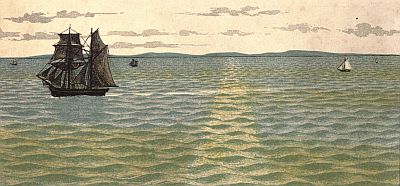
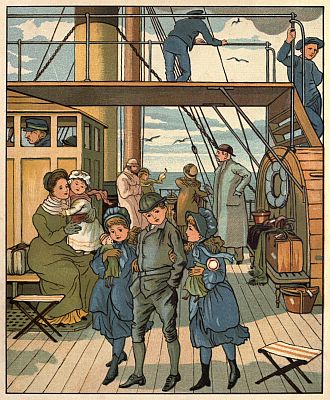
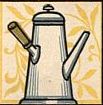
|
| 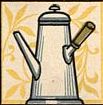
| ||||||||
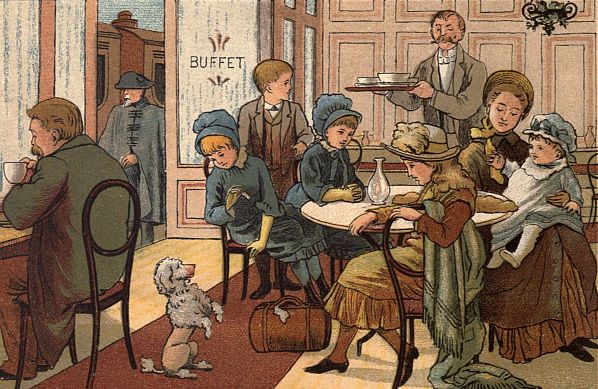
| ||||||||||
| ||||||||||

| ||||||||||
| 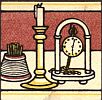
|
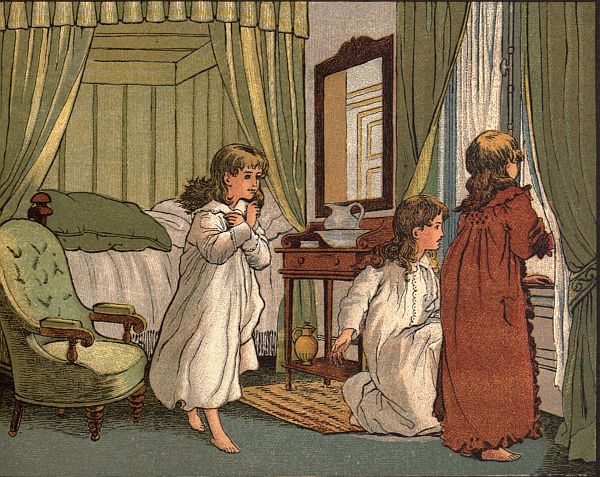
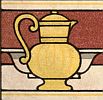
|
|
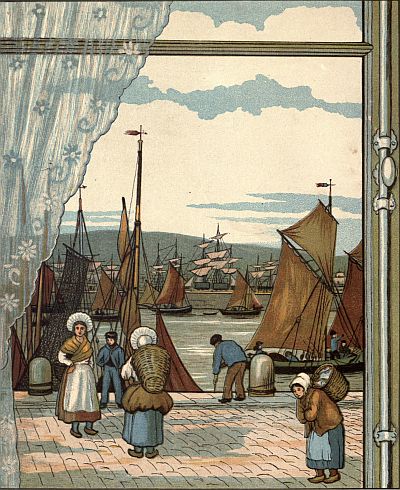
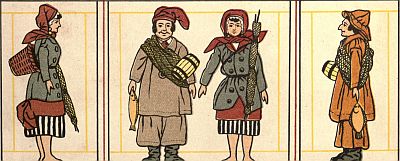
| To Rouen next they went, that very day, | Dennis bought chocolate to make a feast— |
| And heard strange places called out by the way, | They had three dinners in the train, at least. |
| Where bells kept tinkling while the train delayed: | At Rouen here they are at last, though late— |
| At Amiens ten minutes quite they stayed. | The bedroom clock there shows 'tis after eight! |
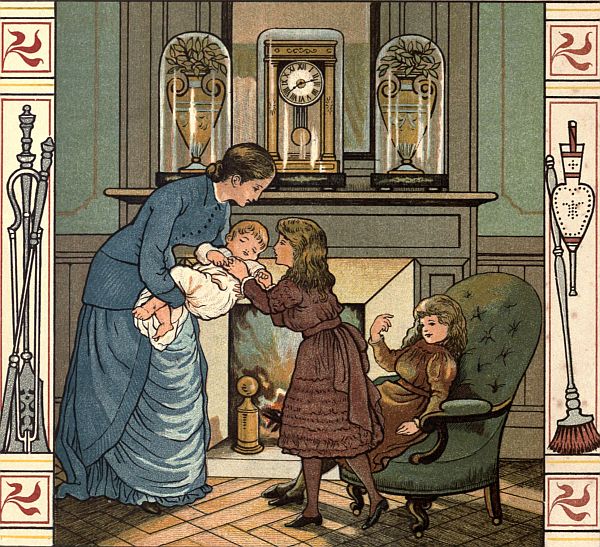
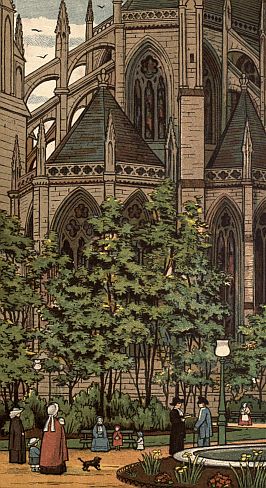
| 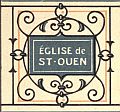
|
| Said Dennis, first, "This city bold Belonged to us In days of old." Said Nellie, "Here Prince Arthur wept— By cruel John A prisoner kept. Here Joan of Arc Was tried and burned, When fickle fate Against her turned." Said Rose, "Oh dear! It makes me sad To think what trouble People had Who lived once in This very town, Where we walk gaily Up and down." | |
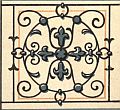
|
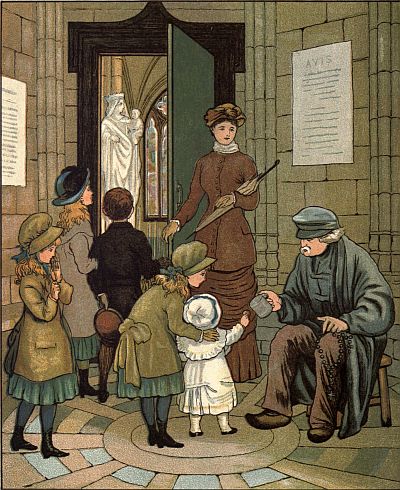
|
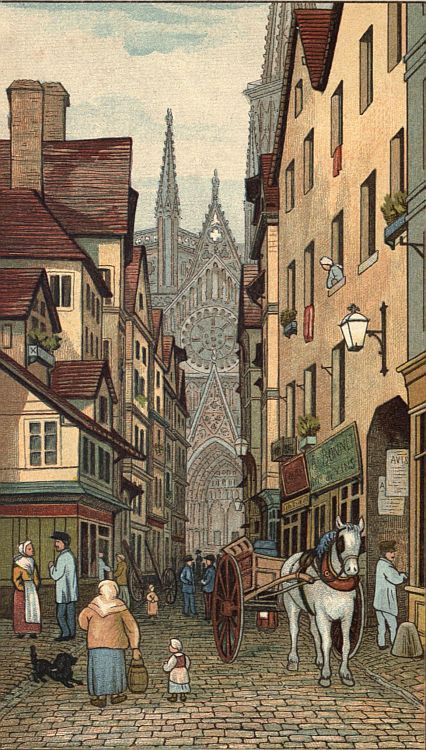
| 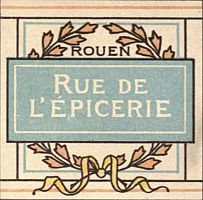
|
| The Cathedral was cold, With its dim solemn aisles, But outside our friends found The sun waiting, with smiles, To show them their way, So hither they came Along an old street With a hard French name. And still walking onward, Through streets we can't see, At length reached the Crèche Of "Sœur Rosalie"— Where poor women's children Are kept all day through, Amused, taught, and tended, And all for one sou. | |
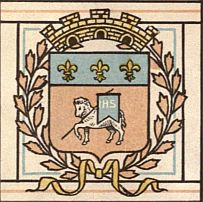
|
|
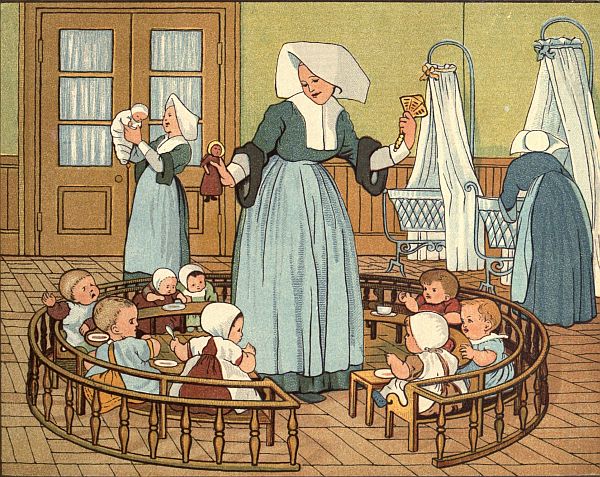
|
|
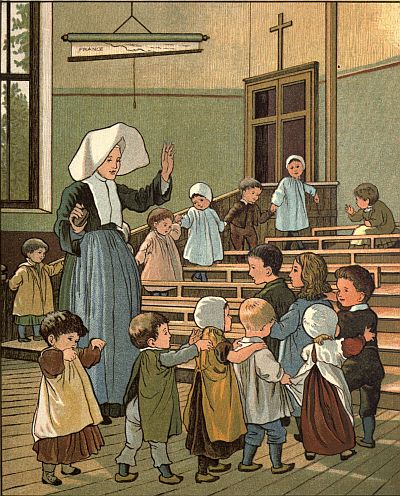

| ARRIVAL AT CAEN. | 
|
| Through Rouen when our friends had been, | Next up the staircase see them go, |
| And all its famous places seen, | With femme de chambre the way to show. |
| They travelled on, old Caen to see, | Father and Dennis, standing there, |
| Another town in Normandy. | Are asking for the bill of fare. |
Arrived at Caen, the travellers here | Monsieur le Maître, who rubs his hands |
| Before the chief Hotel appear, | And says, "What are Monsieur's commands?" |
| Miss Earle, Rose, Bertie you descry— | With scrape and bow, again you see— |
| The rest are coming by-and-by. | The most polite of men is he. |
Monsieur le Maître, with scrape and bow, | |
| Stands ready to receive them now, | |
| And Madame with her blandest air, | |
| And their alert Commissionaire. |
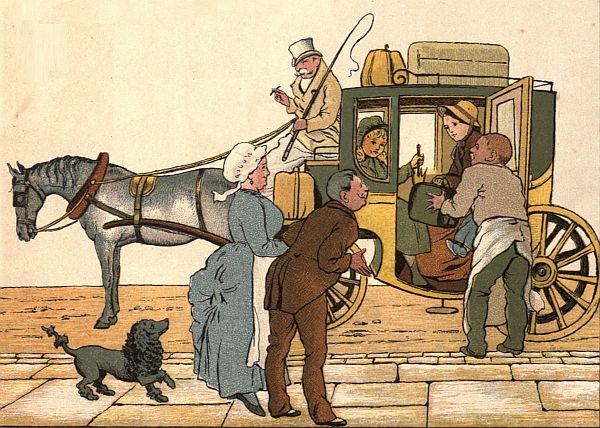
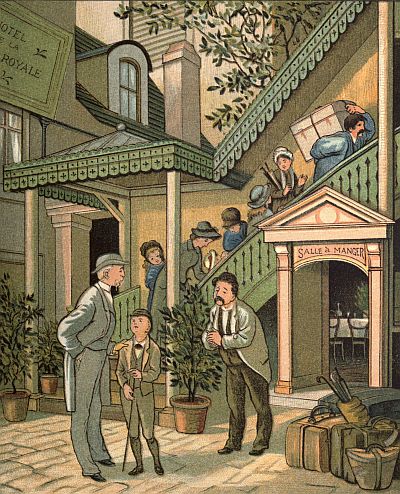

|
| 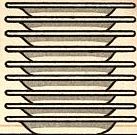
| ||||||
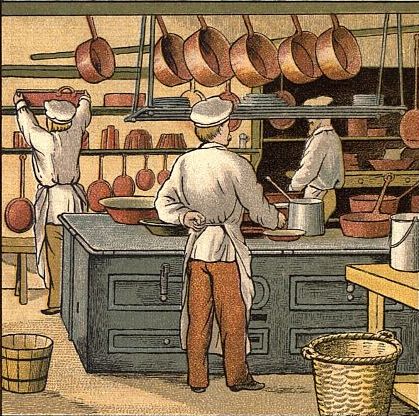
| 
| |||||||
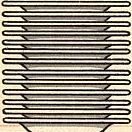
|
|
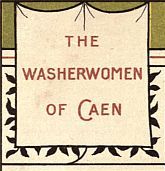
| 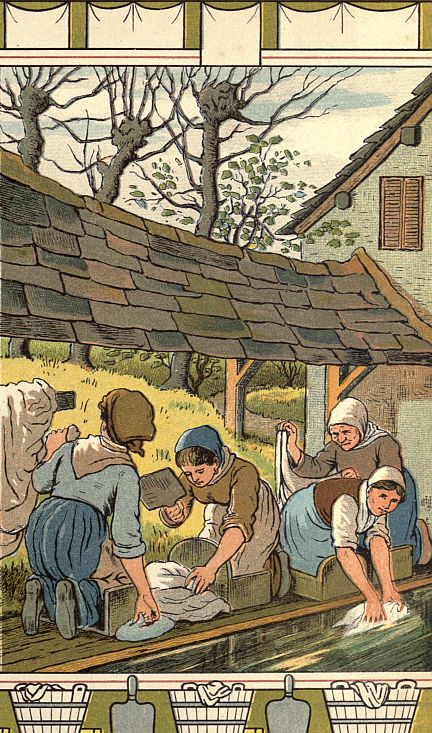
|
| Here the children Came next morn, Walking by The river Orne; Near the poplars On the green, Where the Washerwives Are seen. Here they looked At old Nannette, Wringing out The garments wet; Saw how Eugénie, Her daughter, Soaked them first In running water; Watched the washers Soaping, scrubbing, With their mallets Rubbing, drubbing— Working hard With all their might, Till the clothes Were clean and white. | |
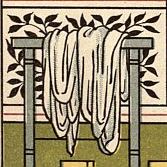
|
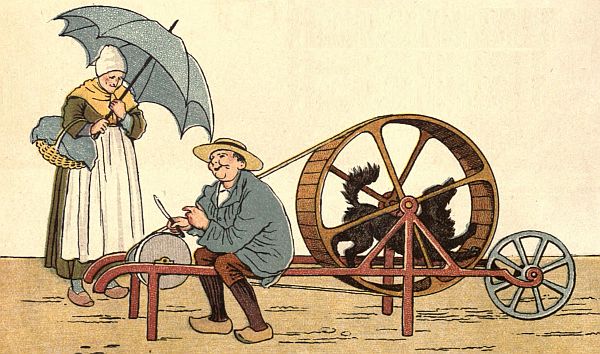
CHOCOLATE AND MILK. Little Lili, whose age isn't three years quite, Went one day with Mamma for a long country walk, Keeping up, all the time, such a chatter and talk Of the trees, and the flowers, and the cows, brown and white. Soon she asked for some cake, and some chocolate too, For this was her favourite lunch every day— "Dear child," said Mamma, "let me see—I dare say | 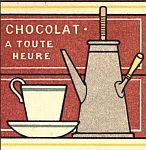
|
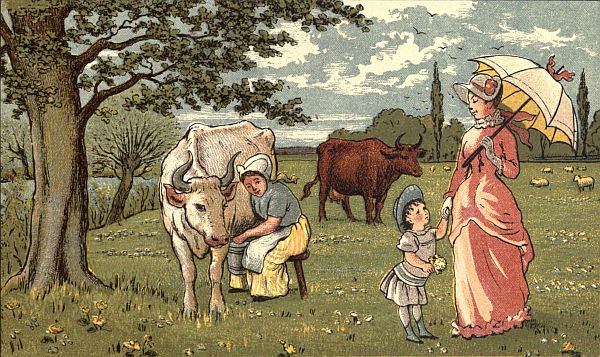
| ||||||||||
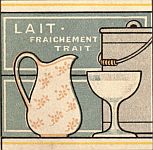
|
| |||||||||
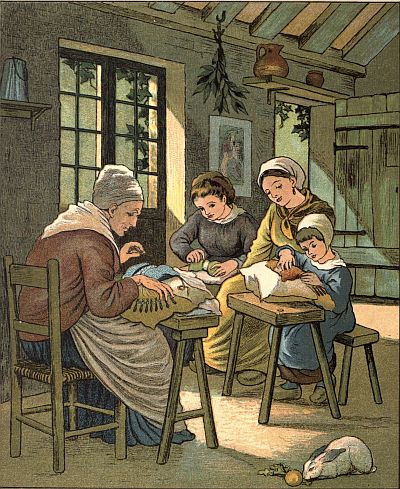
|
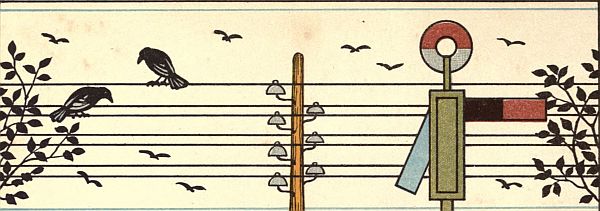
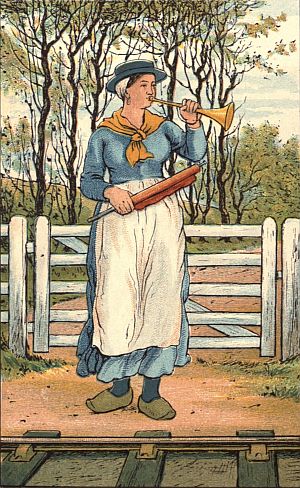
|
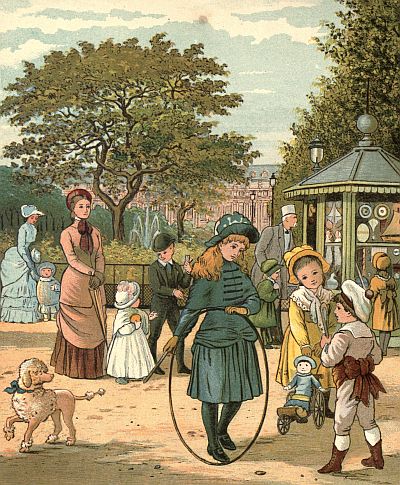

| Paris, gay Paris! so bright and so fair, Your sun is all smiles, and there's mirth in your air. The children, though tired with their travelling, found That the first night in Paris one's sleep is not sound, For the hum of the streets makes one dream all the night Of the wonderful sights that will come with the light. The morning was fine, and—breakfast despatched— They soon made their way to the Gardens attached To the old Royal Palace, and there met a throng Of French children, and joined in their games before long. One boy lent his hoop, and gave Bertie a bun. And—talking quite fast—seemed to think it great fun With nice English girls like our Nellie to play, Though not understanding a word she might say. On leaving the Gardens, the party were seated Outside of a café, and there Papa treated Them all to fine ices and chocolate too; They could hardly tell which was the nicer—could you? Paris, gay Paris, So bright and so fair! Your sun is all smiles, And there's mirth in your air! |
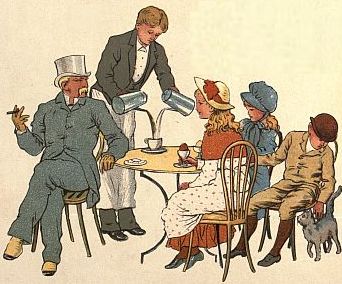
|
IN THE TUILERIES GARDENS. In the Tuileries gardens, each afternoon, A little old man comes walking along: Now watch what happens! for just as soon As they see him, the birds begin their song, And flutter about his hands and head, And perch on his shoulder quite at their ease, For he fills his pockets with crumbs of bread To feed his friends who live in the trees, And well they know he loves them so That into his pockets they sometimes go. But hark to what's going on over there! 'Tis surely a Punch-and-Judy man, Making old Judy, I do declare, Talk French as fast as ever she can! And I think, from the looks of poor Mr. P., He's getting it hot from his scolding wife; But just wait a minute, and then you'll see He'll beat her within an inch of her life. Walk in! take a seat and you'll see her beat, And a penny is all you pay for the treat. |
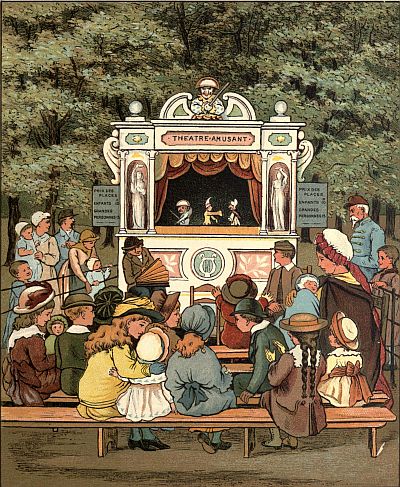
|
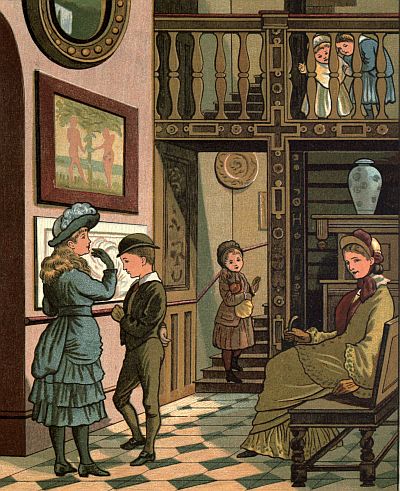
Bertie was first. "I've won the race," he cried; But soon upon his lips the triumph died, And Bertie back in fear to Dennis ran:— "Oh Dennis, look! I ran against that man! He shook and rattled so, and wagged his head, And gave me such a fright!" "Pooh!" Dennis said, "He will not hurt!" And then he made a bow:— Good-bye, old soldier, we must leave you now. Next afternoon, while at the Zoo', a little tale they heard Of the elephant that's there, and you shall hear it word for word. | 
|
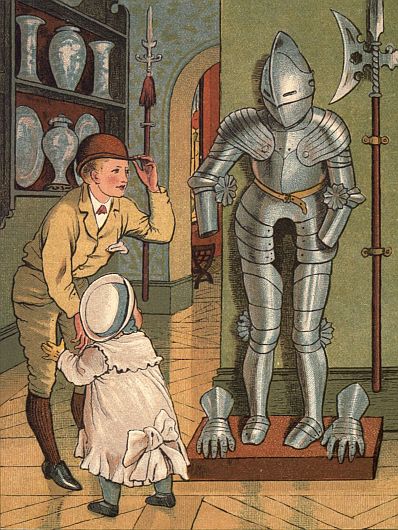
|
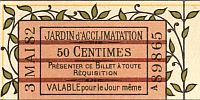
| Mumbo and Jumbo, two elephants great, From India travelled, and lived in state, In Paris the one, and in London the other: Now Mumbo and Jumbo were sister and brother. A warm invitation to Jumbo came, To cross the Atlantic and spread his fame. Said he, "I really don't want to go— But then, they're so pressing!—I can't say No!" |
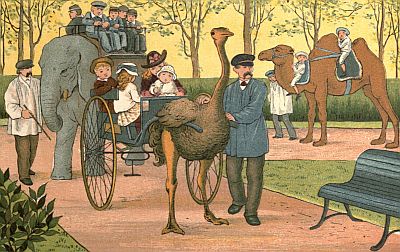
| So away to America Jumbo went, But his sister Mumbo is quite content To stay with the children of Paris, for she Is as happy an elephant as could be: "I've a capital house, quite large and airy, Close by live the Ostrich and Dromedary, And we see our young friends every day," said she: "Oh, where is the Zoo' that would better suit me?" | 
|

| A Steady steed is Mumbo, if just a trifle slow; Upon her back you couldn't well a-steeple-chasing go: But other opportunities there are to have a ride, For there's a stud of ponies, and a camel to bestride— A cart that's drawn by oxen can accommodate a few, | 
|
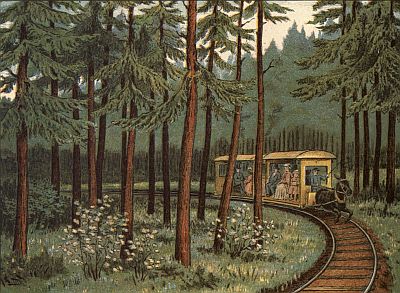

| And if such queer conveyances don't please you at the Zoo', There are little tramway cars too, with seats on either side, Which will take you through the gardens, and through the Bois beside:— Take the ticket on the other page, and with it you may go From the lake within the garden to the gate that's called Maillot. | 
|

| |
| THE SWANS. "Ho! pretty swans, Do you know, in our Zoo' The swans of old England Are just like you?" "Don't tell me!" Said a cross old bird; "I know better, The thing's quite absurd. "Their figures, I'm sure, Are not worth a glance: If you want to see style, You must come to France." With a scornful whisk The swan turned tail, Spread its wings to the breeze, And was off full-sail. "Ho! pretty swan, Do you know, in our Zoo' The swans are not half So conceited as you?" | 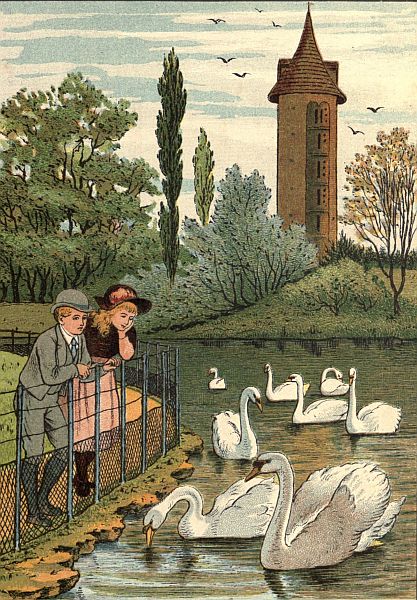
|

| |

| |
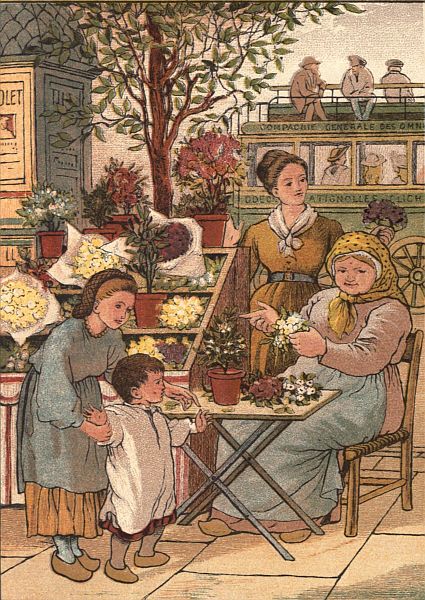
| THE BOULEVARDS Look at Mère Victorine At her stall in the street, With the lily and rose, And the white marguerite, She makes pretty bouquéts The whole of the day: There are buyers in plenty Who pass by that way. Little Basil and Amélie, Watching her, stand: Up to Mère Victorine Basil stretches his hand, "Can't you spare me," says he, "A morsel of green, Or one sweet little flower, Good Mère Victorine?" "If you come for a flower, Pray where is your sou?" Answers Mère Victorine, "I can't give one to you— Such flowers as mine Are for selling, you know; You must go to the country, Where wild flowers grow." |

| |
A DAY AT VERSAILLES.
|
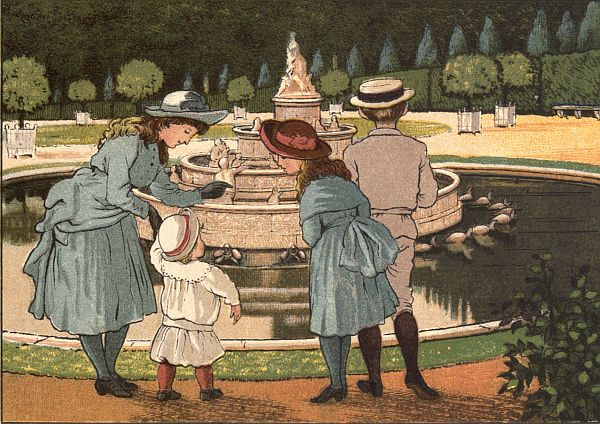
|
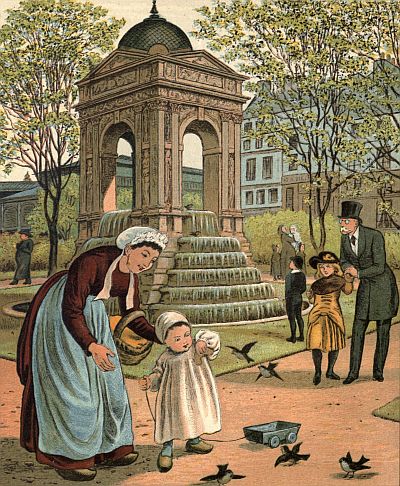

| 
| 
|
| Round this pretty fountain here Sparrows gather all the year; In its sparkling waters dip, From its basin freely sip, Round about their fountain play, Safe and happy all the day;— Little "innocents" are they. That is Antoine, bread in hand; See him by his mother stand: Saucy little birdies spy Antoine's bread, and at it fly, Trying each to get a share, Frightening little Antoine there. Antoine does not wish to share, Thinks the bread is all his right, Just to suit his appetite. Mother says, "Be kind, my son, There is more when this is done; Bread enough for thee at home:— Let the pretty sparrows come; Give them each a little crumb." Here our little family Near the fountain too, we see, Walking through the open space To the covered market-place. | ||

|
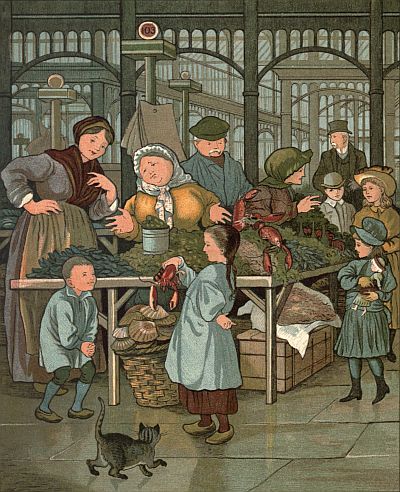
|
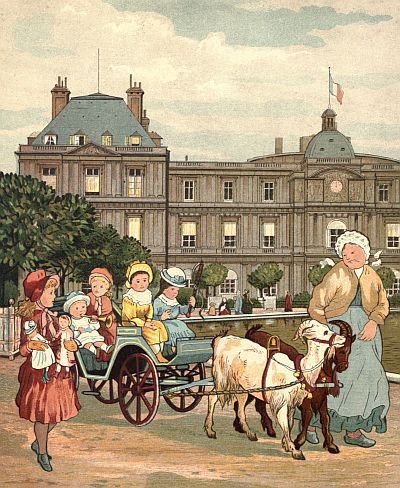
| Rose and Bertie have a ride; Mabel, walking at their side, Carries both the dolls, and so By the Luxembourg they go. | IN THE LUXEMBOURG GARDENS. | |
Over in that Palace soon— For the clock is marking noon— The "Senate" will together come (Like our "House of Lords" at home). | Hear that woman, "Who will buy Windmill, ball, or butterfly"— Josephine and Phillipe, see, Eager as they both can be. | |
Charles before her, silent stands, With no money in his hands, No more sous—he spent them all On that big inflated ball. | ||
| Be content, my little friend, Money spent you cannot spend; With your good St. Bernard play, Buy more toys another day. | ||
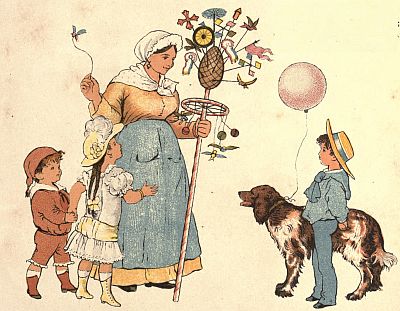
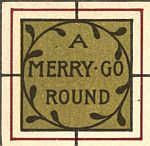
| 
| Here all the day long, Are race-horses for hire, That never go wrong. And besides, never tire. Here all the day long, Are race-horses for hire. | Who will come for a ride? Horses, lions, all ready! Bear or tiger astride, You shall sit safe and steady. Who will come for a ride? Lions, horses, all ready! | 
|
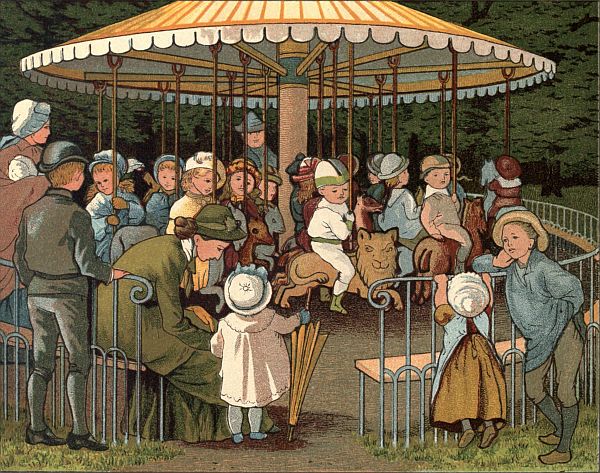
| Round and round they canter slow—soon they fast and faster go; Look at Louis, all in white, Gaspard, almost out of sight, Rose and Mabel side by side;—Bertie watching while they ride. Dennis waits till they have done,—much too big to join the fun; Brother Paul, with serious air, minds his little sister Claire, Thinking if he had a sou, she should have some pleasure too. | 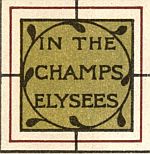
|
| Now, with regret, they've said Good-bye to Paris bright and gay; To Calais they are drawing nigh—you see them on their way. To travel thus, all through the night, at first they thought was fun. But by degrees they grew less bright, as hours passed one by one. Then Nellie to her sisters said, "Let's have an extra rug. And make-believe we're home in bed, and cuddle close and snug, And try, until the night has passed, which can most quiet keep." Then all were tucked up warm and fast, and soon fell sound asleep. | 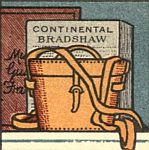
|
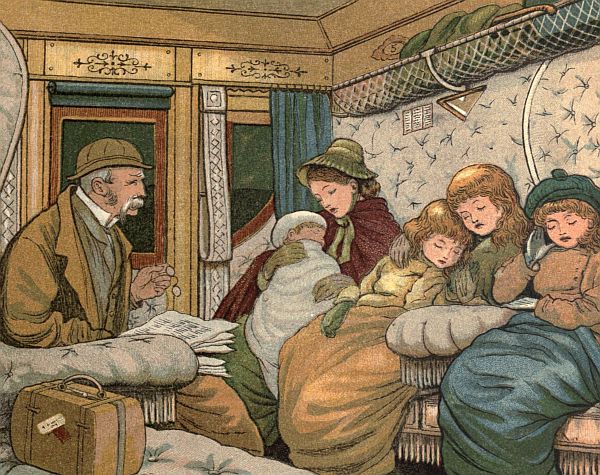
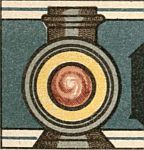
| The happy time abroad, again in dreams is all gone o'er— Again in Paris, as it seems, they watch the crowd once more. The "Elysian Fields," beneath the trees, are peopled with a throng Of loveliest dolls, which at their ease converse, or ride along; And wondrous "Easter Eggs" in nests, abundant lie around, And "April Fish" with golden vests and silver coats, abound! Such fleeting fancies Dreamland lends to pass the time away Until the railway journey ends, just at the break of day. |
| The last place where they stopped abroad was Calais, which, you know, |
| Belonged to England once—though that was many a year ago: |
| It has a beautiful old Tower, all weatherworn and brown, |
| And here's the Sea-Gate, opening from the walls that guard the town. |
| But now Farewell to Merry France! the vessel ready waits |
| To take our party back again across the Dover Straits. |
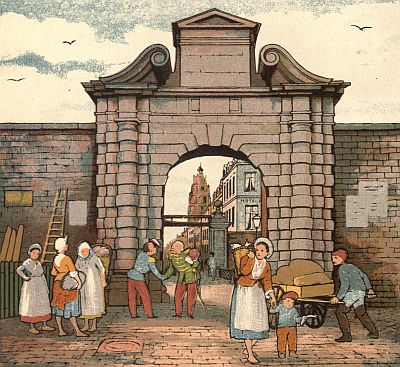
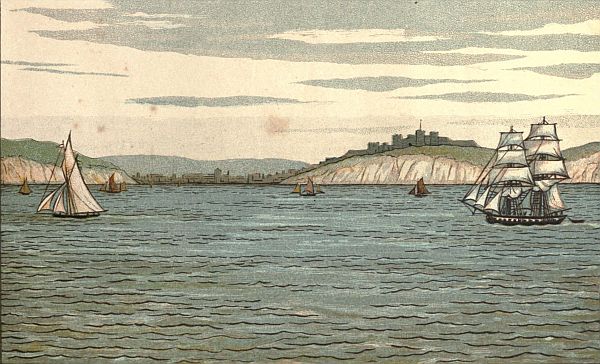
· Bon Rétour ·
|

Obvious punctuation errors repaired.
The remaining corrections made are indicated by dotted lines under the corrections. Scroll the mouse over the word and the original text will appear.
End of the Project Gutenberg EBook of Abroad, by Various
*** END OF THIS PROJECT GUTENBERG EBOOK ABROAD ***
***** This file should be named 23460-h.htm or 23460-h.zip *****
This and all associated files of various formats will be found in:
http://www.gutenberg.org/2/3/4/6/23460/
Produced by Mark C. Orton, Emmy and the Online Distributed
Proofreading Team at http://www.pgdp.net (This file was
produced from images generously made available by The
Internet Archive/American Libraries.)
Updated editions will replace the previous one--the old editions
will be renamed.
Creating the works from public domain print editions means that no
one owns a United States copyright in these works, so the Foundation
(and you!) can copy and distribute it in the United States without
permission and without paying copyright royalties. Special rules,
set forth in the General Terms of Use part of this license, apply to
copying and distributing Project Gutenberg-tm electronic works to
protect the PROJECT GUTENBERG-tm concept and trademark. Project
Gutenberg is a registered trademark, and may not be used if you
charge for the eBooks, unless you receive specific permission. If you
do not charge anything for copies of this eBook, complying with the
rules is very easy. You may use this eBook for nearly any purpose
such as creation of derivative works, reports, performances and
research. They may be modified and printed and given away--you may do
practically ANYTHING with public domain eBooks. Redistribution is
subject to the trademark license, especially commercial
redistribution.
*** START: FULL LICENSE ***
THE FULL PROJECT GUTENBERG LICENSE
PLEASE READ THIS BEFORE YOU DISTRIBUTE OR USE THIS WORK
To protect the Project Gutenberg-tm mission of promoting the free
distribution of electronic works, by using or distributing this work
(or any other work associated in any way with the phrase "Project
Gutenberg"), you agree to comply with all the terms of the Full Project
Gutenberg-tm License (available with this file or online at
http://gutenberg.org/license).
Section 1. General Terms of Use and Redistributing Project Gutenberg-tm
electronic works
1.A. By reading or using any part of this Project Gutenberg-tm
electronic work, you indicate that you have read, understand, agree to
and accept all the terms of this license and intellectual property
(trademark/copyright) agreement. If you do not agree to abide by all
the terms of this agreement, you must cease using and return or destroy
all copies of Project Gutenberg-tm electronic works in your possession.
If you paid a fee for obtaining a copy of or access to a Project
Gutenberg-tm electronic work and you do not agree to be bound by the
terms of this agreement, you may obtain a refund from the person or
entity to whom you paid the fee as set forth in paragraph 1.E.8.
1.B. "Project Gutenberg" is a registered trademark. It may only be
used on or associated in any way with an electronic work by people who
agree to be bound by the terms of this agreement. There are a few
things that you can do with most Project Gutenberg-tm electronic works
even without complying with the full terms of this agreement. See
paragraph 1.C below. There are a lot of things you can do with Project
Gutenberg-tm electronic works if you follow the terms of this agreement
and help preserve free future access to Project Gutenberg-tm electronic
works. See paragraph 1.E below.
1.C. The Project Gutenberg Literary Archive Foundation ("the Foundation"
or PGLAF), owns a compilation copyright in the collection of Project
Gutenberg-tm electronic works. Nearly all the individual works in the
collection are in the public domain in the United States. If an
individual work is in the public domain in the United States and you are
located in the United States, we do not claim a right to prevent you from
copying, distributing, performing, displaying or creating derivative
works based on the work as long as all references to Project Gutenberg
are removed. Of course, we hope that you will support the Project
Gutenberg-tm mission of promoting free access to electronic works by
freely sharing Project Gutenberg-tm works in compliance with the terms of
this agreement for keeping the Project Gutenberg-tm name associated with
the work. You can easily comply with the terms of this agreement by
keeping this work in the same format with its attached full Project
Gutenberg-tm License when you share it without charge with others.
1.D. The copyright laws of the place where you are located also govern
what you can do with this work. Copyright laws in most countries are in
a constant state of change. If you are outside the United States, check
the laws of your country in addition to the terms of this agreement
before downloading, copying, displaying, performing, distributing or
creating derivative works based on this work or any other Project
Gutenberg-tm work. The Foundation makes no representations concerning
the copyright status of any work in any country outside the United
States.
1.E. Unless you have removed all references to Project Gutenberg:
1.E.1. The following sentence, with active links to, or other immediate
access to, the full Project Gutenberg-tm License must appear prominently
whenever any copy of a Project Gutenberg-tm work (any work on which the
phrase "Project Gutenberg" appears, or with which the phrase "Project
Gutenberg" is associated) is accessed, displayed, performed, viewed,
copied or distributed:
This eBook is for the use of anyone anywhere at no cost and with
almost no restrictions whatsoever. You may copy it, give it away or
re-use it under the terms of the Project Gutenberg License included
with this eBook or online at www.gutenberg.org
1.E.2. If an individual Project Gutenberg-tm electronic work is derived
from the public domain (does not contain a notice indicating that it is
posted with permission of the copyright holder), the work can be copied
and distributed to anyone in the United States without paying any fees
or charges. If you are redistributing or providing access to a work
with the phrase "Project Gutenberg" associated with or appearing on the
work, you must comply either with the requirements of paragraphs 1.E.1
through 1.E.7 or obtain permission for the use of the work and the
Project Gutenberg-tm trademark as set forth in paragraphs 1.E.8 or
1.E.9.
1.E.3. If an individual Project Gutenberg-tm electronic work is posted
with the permission of the copyright holder, your use and distribution
must comply with both paragraphs 1.E.1 through 1.E.7 and any additional
terms imposed by the copyright holder. Additional terms will be linked
to the Project Gutenberg-tm License for all works posted with the
permission of the copyright holder found at the beginning of this work.
1.E.4. Do not unlink or detach or remove the full Project Gutenberg-tm
License terms from this work, or any files containing a part of this
work or any other work associated with Project Gutenberg-tm.
1.E.5. Do not copy, display, perform, distribute or redistribute this
electronic work, or any part of this electronic work, without
prominently displaying the sentence set forth in paragraph 1.E.1 with
active links or immediate access to the full terms of the Project
Gutenberg-tm License.
1.E.6. You may convert to and distribute this work in any binary,
compressed, marked up, nonproprietary or proprietary form, including any
word processing or hypertext form. However, if you provide access to or
distribute copies of a Project Gutenberg-tm work in a format other than
"Plain Vanilla ASCII" or other format used in the official version
posted on the official Project Gutenberg-tm web site (www.gutenberg.org),
you must, at no additional cost, fee or expense to the user, provide a
copy, a means of exporting a copy, or a means of obtaining a copy upon
request, of the work in its original "Plain Vanilla ASCII" or other
form. Any alternate format must include the full Project Gutenberg-tm
License as specified in paragraph 1.E.1.
1.E.7. Do not charge a fee for access to, viewing, displaying,
performing, copying or distributing any Project Gutenberg-tm works
unless you comply with paragraph 1.E.8 or 1.E.9.
1.E.8. You may charge a reasonable fee for copies of or providing
access to or distributing Project Gutenberg-tm electronic works provided
that
- You pay a royalty fee of 20% of the gross profits you derive from
the use of Project Gutenberg-tm works calculated using the method
you already use to calculate your applicable taxes. The fee is
owed to the owner of the Project Gutenberg-tm trademark, but he
has agreed to donate royalties under this paragraph to the
Project Gutenberg Literary Archive Foundation. Royalty payments
must be paid within 60 days following each date on which you
prepare (or are legally required to prepare) your periodic tax
returns. Royalty payments should be clearly marked as such and
sent to the Project Gutenberg Literary Archive Foundation at the
address specified in Section 4, "Information about donations to
the Project Gutenberg Literary Archive Foundation."
- You provide a full refund of any money paid by a user who notifies
you in writing (or by e-mail) within 30 days of receipt that s/he
does not agree to the terms of the full Project Gutenberg-tm
License. You must require such a user to return or
destroy all copies of the works possessed in a physical medium
and discontinue all use of and all access to other copies of
Project Gutenberg-tm works.
- You provide, in accordance with paragraph 1.F.3, a full refund of any
money paid for a work or a replacement copy, if a defect in the
electronic work is discovered and reported to you within 90 days
of receipt of the work.
- You comply with all other terms of this agreement for free
distribution of Project Gutenberg-tm works.
1.E.9. If you wish to charge a fee or distribute a Project Gutenberg-tm
electronic work or group of works on different terms than are set
forth in this agreement, you must obtain permission in writing from
both the Project Gutenberg Literary Archive Foundation and Michael
Hart, the owner of the Project Gutenberg-tm trademark. Contact the
Foundation as set forth in Section 3 below.
1.F.
1.F.1. Project Gutenberg volunteers and employees expend considerable
effort to identify, do copyright research on, transcribe and proofread
public domain works in creating the Project Gutenberg-tm
collection. Despite these efforts, Project Gutenberg-tm electronic
works, and the medium on which they may be stored, may contain
"Defects," such as, but not limited to, incomplete, inaccurate or
corrupt data, transcription errors, a copyright or other intellectual
property infringement, a defective or damaged disk or other medium, a
computer virus, or computer codes that damage or cannot be read by
your equipment.
1.F.2. LIMITED WARRANTY, DISCLAIMER OF DAMAGES - Except for the "Right
of Replacement or Refund" described in paragraph 1.F.3, the Project
Gutenberg Literary Archive Foundation, the owner of the Project
Gutenberg-tm trademark, and any other party distributing a Project
Gutenberg-tm electronic work under this agreement, disclaim all
liability to you for damages, costs and expenses, including legal
fees. YOU AGREE THAT YOU HAVE NO REMEDIES FOR NEGLIGENCE, STRICT
LIABILITY, BREACH OF WARRANTY OR BREACH OF CONTRACT EXCEPT THOSE
PROVIDED IN PARAGRAPH F3. YOU AGREE THAT THE FOUNDATION, THE
TRADEMARK OWNER, AND ANY DISTRIBUTOR UNDER THIS AGREEMENT WILL NOT BE
LIABLE TO YOU FOR ACTUAL, DIRECT, INDIRECT, CONSEQUENTIAL, PUNITIVE OR
INCIDENTAL DAMAGES EVEN IF YOU GIVE NOTICE OF THE POSSIBILITY OF SUCH
DAMAGE.
1.F.3. LIMITED RIGHT OF REPLACEMENT OR REFUND - If you discover a
defect in this electronic work within 90 days of receiving it, you can
receive a refund of the money (if any) you paid for it by sending a
written explanation to the person you received the work from. If you
received the work on a physical medium, you must return the medium with
your written explanation. The person or entity that provided you with
the defective work may elect to provide a replacement copy in lieu of a
refund. If you received the work electronically, the person or entity
providing it to you may choose to give you a second opportunity to
receive the work electronically in lieu of a refund. If the second copy
is also defective, you may demand a refund in writing without further
opportunities to fix the problem.
1.F.4. Except for the limited right of replacement or refund set forth
in paragraph 1.F.3, this work is provided to you 'AS-IS' WITH NO OTHER
WARRANTIES OF ANY KIND, EXPRESS OR IMPLIED, INCLUDING BUT NOT LIMITED TO
WARRANTIES OF MERCHANTIBILITY OR FITNESS FOR ANY PURPOSE.
1.F.5. Some states do not allow disclaimers of certain implied
warranties or the exclusion or limitation of certain types of damages.
If any disclaimer or limitation set forth in this agreement violates the
law of the state applicable to this agreement, the agreement shall be
interpreted to make the maximum disclaimer or limitation permitted by
the applicable state law. The invalidity or unenforceability of any
provision of this agreement shall not void the remaining provisions.
1.F.6. INDEMNITY - You agree to indemnify and hold the Foundation, the
trademark owner, any agent or employee of the Foundation, anyone
providing copies of Project Gutenberg-tm electronic works in accordance
with this agreement, and any volunteers associated with the production,
promotion and distribution of Project Gutenberg-tm electronic works,
harmless from all liability, costs and expenses, including legal fees,
that arise directly or indirectly from any of the following which you do
or cause to occur: (a) distribution of this or any Project Gutenberg-tm
work, (b) alteration, modification, or additions or deletions to any
Project Gutenberg-tm work, and (c) any Defect you cause.
Section 2. Information about the Mission of Project Gutenberg-tm
Project Gutenberg-tm is synonymous with the free distribution of
electronic works in formats readable by the widest variety of computers
including obsolete, old, middle-aged and new computers. It exists
because of the efforts of hundreds of volunteers and donations from
people in all walks of life.
Volunteers and financial support to provide volunteers with the
assistance they need, is critical to reaching Project Gutenberg-tm's
goals and ensuring that the Project Gutenberg-tm collection will
remain freely available for generations to come. In 2001, the Project
Gutenberg Literary Archive Foundation was created to provide a secure
and permanent future for Project Gutenberg-tm and future generations.
To learn more about the Project Gutenberg Literary Archive Foundation
and how your efforts and donations can help, see Sections 3 and 4
and the Foundation web page at http://www.pglaf.org.
Section 3. Information about the Project Gutenberg Literary Archive
Foundation
The Project Gutenberg Literary Archive Foundation is a non profit
501(c)(3) educational corporation organized under the laws of the
state of Mississippi and granted tax exempt status by the Internal
Revenue Service. The Foundation's EIN or federal tax identification
number is 64-6221541. Its 501(c)(3) letter is posted at
http://pglaf.org/fundraising. Contributions to the Project Gutenberg
Literary Archive Foundation are tax deductible to the full extent
permitted by U.S. federal laws and your state's laws.
The Foundation's principal office is located at 4557 Melan Dr. S.
Fairbanks, AK, 99712., but its volunteers and employees are scattered
throughout numerous locations. Its business office is located at
809 North 1500 West, Salt Lake City, UT 84116, (801) 596-1887, email
business@pglaf.org. Email contact links and up to date contact
information can be found at the Foundation's web site and official
page at http://pglaf.org
For additional contact information:
Dr. Gregory B. Newby
Chief Executive and Director
gbnewby@pglaf.org
Section 4. Information about Donations to the Project Gutenberg
Literary Archive Foundation
Project Gutenberg-tm depends upon and cannot survive without wide
spread public support and donations to carry out its mission of
increasing the number of public domain and licensed works that can be
freely distributed in machine readable form accessible by the widest
array of equipment including outdated equipment. Many small donations
($1 to $5,000) are particularly important to maintaining tax exempt
status with the IRS.
The Foundation is committed to complying with the laws regulating
charities and charitable donations in all 50 states of the United
States. Compliance requirements are not uniform and it takes a
considerable effort, much paperwork and many fees to meet and keep up
with these requirements. We do not solicit donations in locations
where we have not received written confirmation of compliance. To
SEND DONATIONS or determine the status of compliance for any
particular state visit http://pglaf.org
While we cannot and do not solicit contributions from states where we
have not met the solicitation requirements, we know of no prohibition
against accepting unsolicited donations from donors in such states who
approach us with offers to donate.
International donations are gratefully accepted, but we cannot make
any statements concerning tax treatment of donations received from
outside the United States. U.S. laws alone swamp our small staff.
Please check the Project Gutenberg Web pages for current donation
methods and addresses. Donations are accepted in a number of other
ways including checks, online payments and credit card donations.
To donate, please visit: http://pglaf.org/donate
Section 5. General Information About Project Gutenberg-tm electronic
works.
Professor Michael S. Hart is the originator of the Project Gutenberg-tm
concept of a library of electronic works that could be freely shared
with anyone. For thirty years, he produced and distributed Project
Gutenberg-tm eBooks with only a loose network of volunteer support.
Project Gutenberg-tm eBooks are often created from several printed
editions, all of which are confirmed as Public Domain in the U.S.
unless a copyright notice is included. Thus, we do not necessarily
keep eBooks in compliance with any particular paper edition.
Most people start at our Web site which has the main PG search facility:
http://www.gutenberg.org
This Web site includes information about Project Gutenberg-tm,
including how to make donations to the Project Gutenberg Literary
Archive Foundation, how to help produce our new eBooks, and how to
subscribe to our email newsletter to hear about new eBooks.